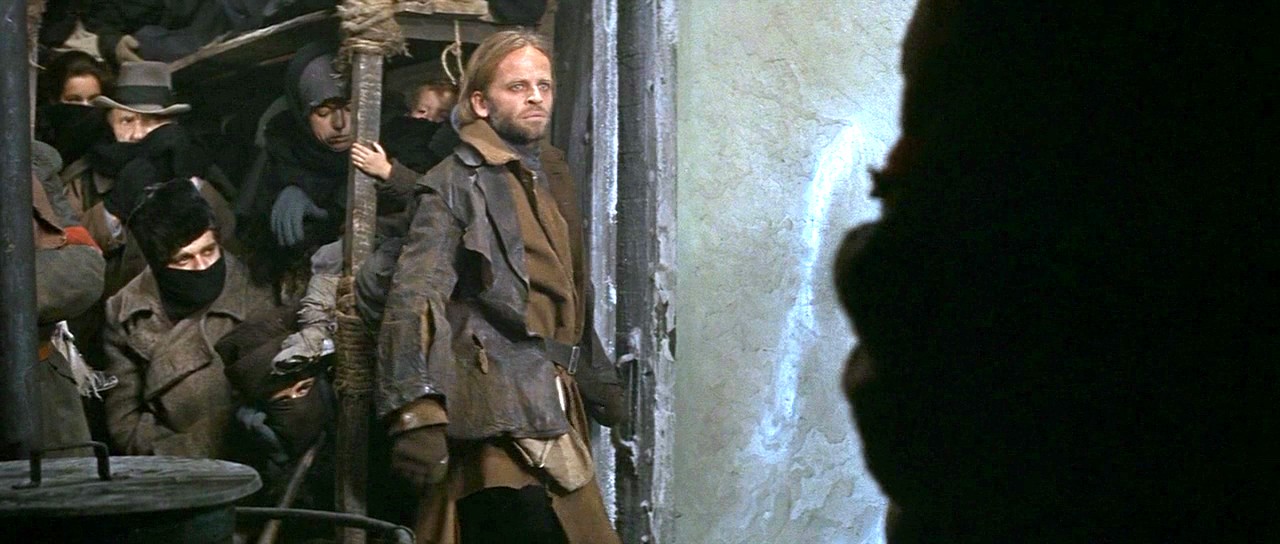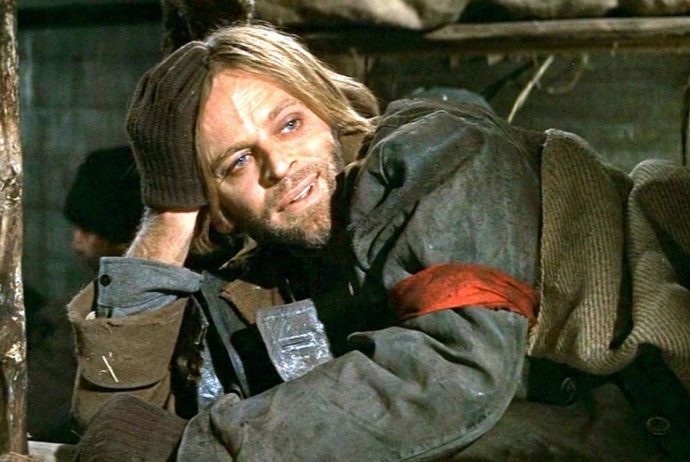Dir: David Lean
Star: Omar Sharif, Julie Christie, Geraldine Chaplin, Klaus Kinski
Adjusted for inflation, this is the most successful film at the North American box-office, in which Klaus ever appeared. The $111 million it took over half a century ago, would be close to ten times as much nowadays. Though it wasn’t even the biggest hit of the year: that was the other great totalitarian love-story of 1965 – the one with more nuns, The Sound of Music. Julie Andrews also kicked Omar Sharif’s butt at the Academy Awards, largely relegating Zhivago to technical awards, despite nominations including Best Picture and Best Director.
It wasn’t universally adored on release, and generally seems to be regarded as a bit less successful than the Lean/Sharif epic which preceded it, Lawrence of Arabia. Though it shares with that film an apparent belief that quality can be measured in minutes of running time. This was not uncommon in the sixties, peaking with Cleopatra, which premiered at a seat-numbing 248 minutes in length. This is relatively terse, at a mere 193 minutes in the original version (slightly longer in the 1992 re-release), although it doesn’t help that Zhivago opens with an overture – before even the MGM lion has shown up – and also extends itself with an intermission and an entr’acte.
The story takes place against the background of the Russian revolution. There’s a framing device, in which Bolshevik security officer Yevgraf Zhivago (Alec Guinness) questions a young woman whom he believes to be the daughter of his half-brother, the physician and poet, Yuri Zhivago (Sharif). She doesn’t remember much of her life or her father, so he fills in the lengthy back story. And in post-WW2 Russia, when a KGB officer wants to tell you a lengthy back story, you sit there and listen to the lengthy back story. Likely while trying to look incredibly interested, if you’ve any sense.
It’s basically a love-triangle, sprawling across three decades and thousands of miles of Eurasia. Yuri is orphaned as a child, and goes to live in Moscow with his mother’s friends. He studies hard, becomes a doctor and marries their daughter, Tonya (Chaplin). Meanwhile, Lara (Christie) is having an affair with a well-connected upper-class man, but being courted by young political firebrand Pavel Antipov (Tom Courtenay). When Lara’s mother learns of her daughter’s affair, she attempts suicide: Yuri is one of the attending doctors, which is how he meets Lara. She shoots her lover at a Christmas party, and marries Pavel, but works with Yuri as a nurse during World War I and the ensuing Bolshevik revolution. It’s during this time he falls for her.

After the war, Yuri is on thin ice, due to his decadent, bourgeois poetry, and Yevgraf arranges for his half-brother, Tanya and their child to find sanctuary in the Ural Mountains. However – what are the odds? – Lara shows up in a town nearby, and the two begin a passionate affair. This romance is interrupted only by Pavel now being a notorious Bolshevik commander, calling himself Strelnikov. Oh, plus Yuri’s involuntary recruitment into a local group of partisans for a couple of years. By the time he escapes, Tanya has fled to Paris, leaving Yuri and Lara to live happily eve… Nah, who am I kidding. This is gloomy Russian romance at its gloomiest. Long story short, they are split up, and years later (spoiler alert), Yuri drops dead of a heart attack on a Moscow street after seeing Tanya from a passing tram and trying to chase her.
There’s no denying the epic scope here, with some phenomenal photography, courtesy of cinematographer Freddie Young (who replaced Nicolas Roeg a few days into the shoot). But I couldn’t quite bring myself to empathize with Yuri, who frankly, behaves like a bit of a dick to the loyal and dutiful Tanya. Look: you want to be with someone else, that’s fine. Go be with them. Don’t bounce back and forth, trying to have your blonde cake while eating the brunette version, too. It never works out for anyone. Maybe I’d cut him some slack, if we were convinced Zhivago was the genius poet frequently claimed: yet his actual poetry here is notable by its absence.
Let’s narrow the focus onto Kinski’s brief appearance. It’s a glorious performance, as anarchist Kostoyed Amoursky [not named in the film], who is one of the Zhivago’s fellow travelers, as they head east on a train, in a literal cattle car. He’s part of a forced labor platoon, convicted due to his counter-revolutionary views. While he may be captured, Amoursky is utterly unbowed, spewing venom and invective at everyone else, and proclaiming himself “the only free man on this train. The rest of you are cattle!” His preferred term of abuse appears to be “lickspittle,” a word which I feel deserves to be more frequently used in modern society – perhaps along with My Fair Lady‘s “guttersnipe.”
It’s only a few minutes of screen time in a very, very long movie, but is one of Kinski’s most scene-stealing roles. I was particularly surprised to see, despite being a relatively early entry – well before his partnership with Werner Herzog – this is what you might call the archetypal Klaus role. By which I mean, an unhinged loose cannon, contemptuous of the world and absolutely convinced of his own moral and/or intellectual superiority. At a point where Kinski was mostly known for his performances in the German Edgar Wallace films, which were generally much more understated, it’s a fun precursor to the more… vocal, shall we say, roles which were to come.

Re “There’s a framing device, in which KGB officer Yevgraf Zhivago (Alec Guinness) questions a young woman whom he believes to be the daughter of his half-brother, the physician and poet, Yuri Zhivago (Sharif).”
The KGB (Commitee for State Security) wouldn’t exist for decades. Yevgraf was a member of its forerunner, the Cheka.
Good catch! I updated it to “Bolshevik security” officer, rather than having to explain what the Cheka was. Thanks for the comment!
Klaus Kinski was a Sensational Actor . Here in Dr Shivago and all. Movies he was in. 🙂❤️🌻